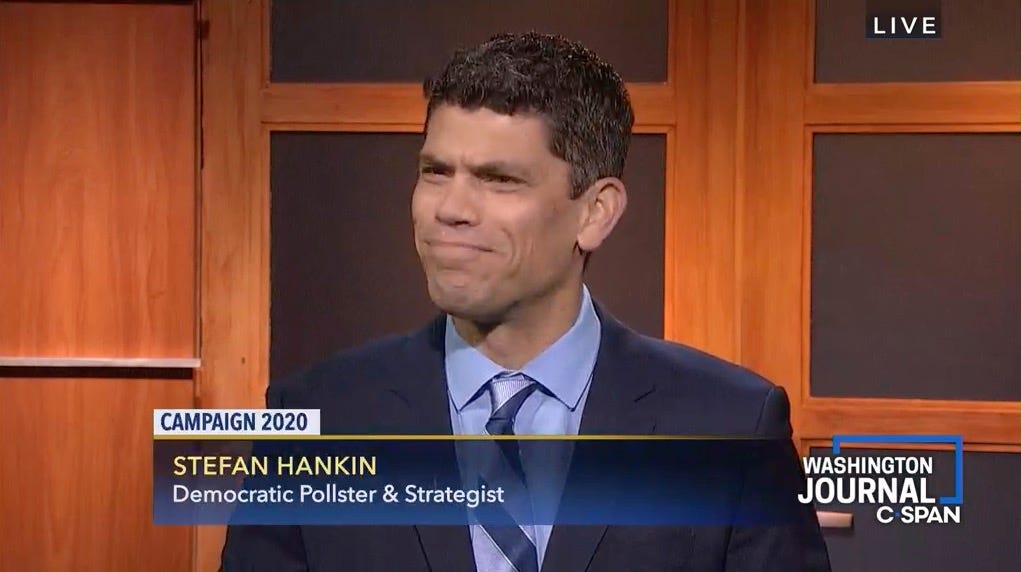Worst Possible Outcome
How good people tried to do the right thing and ended up with the worst result
Welcome to The Experiment, the weekly newsletter where we’re making our way through the Uncertain Now. And I don’t want to jinx anything, but Worst. Coup. Ever. Amirite?
This week a bunch of us are already looking ahead. Jamie Tinsley is looking at her second Christmas as a widow in “Are you new here?” Sonia Van Meter’s plumbing season three of Star Trek: Discovery for deeper meaning in “f*ck yeah, mama.” Both Jack Hughes and Elie Jacobs look ahead to Trump 2024, the former in “The Cleve” and the latter in “Dateline Jacksonville.” Stefan Hankin completes his laudable centrist fantasy with “The Case for a Coalition Government,” and Robin Whetstone — I’m reluctant even to type these words — concludes her Moscow memoir with “Easy Rider.”
And as always, we remember who we lost and offer suggestions on what to do (order books from this Austin Black-owned bookstore), read (this might be the funniest and smartest thing Alexandra Petri ever wrote), watch (Dave Chapelle’s SNL monologue was ludicrously good), and listen to (why didn’t you tell me about Partner?).
But first, I want to take you down a path paved with good intentions.
The people in this story did not try to achieve the worst possible outcome, but that’s where we will end up at the end of this story even though everyone set out with the best of intentions. This is a story about the conflict between affordable housing and gentrification and one city’s lack of success, as one grim city hall aide told me, to “help folks who are holding on and trying to remain while we build for the future.”
This all starts where the Tonkowda tribe settled along the Colorado River southeast of Austin. A century later, an early Anglo settler built a casino on the nearby hill and called the spot Montopolis. After the Civil War, newly freed Black people settled there, and in the 20th century Mexican immigrants settled on this hillside spot where they had a great vantage point to Austin’s inexorable growth, doubling in population every 20-25 years.
The view does not go both ways. I’ve lived in Austin since the ‘90s and had only ever driven past Montopolis on the way to the airport. Curious, Sonia and I drove through the neighborhood last weekend. We saw one guy checking his mailbox at the end of his driveway wearing baggy underwear and an undershirt. Picture a poor neighborhood with a lot of modest single-family homes interspersed by larger, newer homes on lots with enviable views of downtown and you get the idea. Most in this neighborhood are hanging onto the lowest rung of the middle class. One of the last bastions of minority homeownership in Austin is going the way of the Tonkowda.
There is a house at 508 Kemp Street that sits on the bluff where you can see the sunset cast what looks like a violet crown over the Texas capital. This story is about what is going to happen to the 2.18-acre lot. Forget the house. It’s a teardown. This is just about what is going to be built in its place. Keeping things as they are — which is what most longtime Montopolis residents want — is not on the table.
It would be easy to blame gentrification on the newcomers with the expensive cars in the driveways along Kemp Street, but it’s not their fault. Austin hasn’t made enough space for all the people who keep moving to the city that started booming in the 1990s and never stopped. Half a million people lived in Austin when I moved here in 1994. Now there are 2 million. From 2002 to 2012, income growth was flat but housing costs rose 85% largely because the supply did not kept pace with the rising demand at any income level. So there are not enough expensive homes for wealthy buyers who are then forced into the market for less expensive homes, causing a cascading and compounding effect down the economic ladder until the fingers wrapped around the bottom rungs get stepped on. This is how neighborhoods such as Montopolis get gentrified and Austin becomes less diverse.
Keeping things as they are — which is what most longtime Montopolis residents want — is not on the table.
Austin’s housing shortage is most painfully felt by the poor. Austin has a staggering shortage of affordable housing. If you had an affordable rental unit for every one of Donald Trump’s lies that the Washington Post has documented and then doubled it, you still wouldn’t have enough places for all the poor people in Austin to live. Meanwhile, we’re growing like crazy and have been since the days of dial-up modems. If you were living in Montopolis, you might blame growth for pushing you out of your neighborhood when the problem is that there isn’t enough growth. Austin needs more of all kinds of housing, and increasing the housing supply will help those most in need of affordable housing. But building that housing can, paradoxically, can disrupt those communities which would be best served by more affordable housing.
The problem is that state law in Texas forbids cities from requiring developers to build affordable housing. All they can do is offer cookies (such as waiving fees and abating taxes) in exchange for the developer building housing that will bring in lower rents. That is, unless the developer needs a lot rezoned, at which point horses can be traded.
In January 2020 Fred McGhee, a historian, anti-gentrification activist, and leader of the Montopolis Community Development Corporation, approached the city with his own plan for 508 Kemp Street. He proposed building 20 single-family homes on the lot, one or two bedrooms each, all targeted to buyers making 60% of Austin's median family income, which is $58,550 a year for four people. All he needed was $1.8 million for planning and another $9 million to build it, and of course the city council would need to rezone the lot from single-family to multi-family. Maybe it was the fact that McGhee has never developed a property before (though he had assembled an experienced team) or that taxpayers would have to foot the entire $9.8 million bill. Either way, the Austin Housing Finance Corporation expressed muted enthusiasm, and McGhee withdrew his application. No one really thinks McGhee was out to make a buck here, though he would have. He loves Montopolis so much he wrote a history of the neighborhood. He’s all about people from the community preserving the community.
Then a real estate developer bought the rights to 508 Kemp Street and thought a better use for the land would be to build a 26 2-4 bedroom condos going for $330,000 to $525,000, that is, a lot more than people in the neighborhood could afford but less than 10 bigger McMansions would fetch on the market. And as a further nod to the neighborhood, they would grant an easement to the bluff, so anyone in the neighborhood could walk onto the property and enjoy the view. All this required zoning changes, which required city council approval. So the developer hired a lobbyist to shepherd the plan through approval process, which as we will see might be misnamed. The city council took one look at it and, even though a lot next door got the same zoning change a few years ago, told the lobbyist to kindly tell the developer to get bent. Luxury condos? In Montopolis? With no affordable housing?
The lot at 508 Kemp Street was zoned for single-family housing and was big enough to be divided into five separate lots that could hold two single-family homes each going for several hundred thousand dollars each. The developer could have just gone ahead and done that and made a bunch of money. There is no reason for the developer to have done what it did next other than maybe it thought it could make a little more money by making the city a better offer.
The developer partnered with Habitat for Humanity on a much more ambitious condo project. They would build 33 condos, 17 of which Habitat would own and sell as permanently affordable units to buyers making 80% of the average family income. These 2-to-4 bedroom units would go from $187,000 to $234,000. The developer would keep 16 units and sell those at market rates. What’s more, Habitat would have this all in a legally enforceable contract. This was not a handshake deal, and the developer could not back out later. Cost to the taxpayer: zero dollars.
The city council said yes.
Fred McGhee said no.
“We were the place that people came for refuge when they were kicked out of Austin,” McGhee said. “And now they want to come for us? We’re not going to take that sitting down. We’re going to fight.”
And by that, he meant that he would now oppose someone else getting what he sought: rezoning the property from single-family to multi-family.
“We can flex to a certain extent, but this is one where we’ve got to say no,” he added. “This is a bright line you cannot cross.”
The city council needs to pass items on three readings. The Montopolis neighborhood association got enough people to sign a petition to trigger a requirement that a supermajority of the council, nine votes, pass the rezoning request. Only seven supported it.
The war is fought lot by lot in a battle that never seems to end, because as much as a city is a destination it’s also a journey, a place where people pass through time. The city you moved to in the 1980s might still be called Austin, but the dance halls and restaurants will change over like the cells in your body regenerate every seven years. Some see growth as the enemy. Others look to San Francisco, where the average home crossed north of $1 million a few years ago because their anti-growth policies failed to make new spaces for everyone. Supply and demand, like a pandemic, doesn’t care about your politics, but all that is on a macro level. On Kemp Street, a teacher barely making her mortgage takes in the view of the new skyscrapers and asks where she fits into this.
Hostilities in Montopolis over what to do with this single lot escalated quickly. The neighborhood association attacked “the forces of rapacious development” and “profit-seeking real estate developers” who were guilty of “human rights violation[s]”. Activists said they just wanted the developer to go away and questioned whether the promise of affordable housing was even real. And if poor folks in Montopolis can’t afford the affordable units, then are they really affordable?
McGhee charged that white leadership of Habitat for Humanity was being favored over the local group he had assembled because of skin color, tweeting, “The days of white-controlled non profits running and ruling over community development dollars in poor minority communities must come to an end.” Later he tweeted, “Only city hall sanctioned non-profits must be allowed access to taxpayer money. Their pink skin protects them.”
When a former member of the volunteer board that makes recommendations to the city council on zoning matters pointed out that not approving the rezoning would ensure that 508 Kemp Street would end up with McMansions going for $600-$800,000, McGhee called his analysis “racist, disrespectful, plain simple.”


It’s easy for comfortable white people to assume that unfounded accusations of racism are evidence of moral fraud, but Austin has a record of racism that we like to think is only in the past. There is a bar district in Austin many people call “Dirty Sixth.” Most people think it got that nickname because of what goes on there after dark, but the truth is it got that name because Sixth Street used to be where the Black and Mexican-American shopkeepers clustered. When the nearby neighborhoods where Black homeowners lived became desirable, the city insidiously hired a zoning consultant, and in 1927 Austin passed a law that segregated the city. If Black or brown people wanted utilities, they had to live east of East Avenue.
In 1968, Austin passed a Fair Housing Ordinance over the opposition of the Austin Board of Realtors, which successfully pushed to overturn the ordinance nine years later. According to McGhee, “ABOR's phone bankers would rhetorically ask ‘Do you want a Nigger living next to you?’” By then, the interstate freeway had been built over East Avenue, increasing the literal divide between the white and nonwhite parts of the city.
“If it does not pass then this would be a nice case study for us to see what happens to that lot and what kind of housing actually gets built there.”
When I moved here in the ‘90s, I called about a vacant apartment in east Austin. The listing agent could hear I was white and said I would be happier elsewhere. The Black middle-class moved from east Austin to the suburbs shortly thereafter in search of better schools. Gentrification is wiping out the remaining Black population, and now Austin is the largest city where Blacks are a declining share of the population. Not counting people I know from work, I have one Black friend in Austin. Austin’s schools are the most segregated in Texas, and Austin is one of the most economically segregated in the country.
Like I said, they’ve got a great view of things from Montopolis. They can see for years and years.
Mayor Pro Tem Delia Garza, who early on demanded more affordable housing in exchange for upzoning 508 Kemp Street, warned the opposition that their choice wasn’t this project or nothing; their options were this project or zero affordable housing.
“It's just gotten so toxic, the conversation, and so filled with misinformation. We know what the facts are, we know what the realities are,” she said. “That's the scenario where there could be only ten units there up to $800,000. And there's nothing, absolutely nothing that we can do about that.”
“If it does not pass then this would be a nice case study for us to see what happens to that lot and what kind of housing actually gets built there,” said Pio Renteria, a city council member who grew up in east Austin and the one whose district includes Montopolis. “And it will definitely be, you know, an eye opener for people that have been fighting this.”
Garza and Renteria made those remarks at a city council meeting on October 15; three days later, a 2-bedroom, 2.5-bath house at 408 Kemp Street went on the market for $785,000. “Entertain on the rooftop terrace with built-in fire pit and take in the stunning downtown Austin skyline views,” touted the listing. “Sunday Funday at Secret Beach!”


The developers only needed two more members of the city council to get on board. Everyone representing east Austin was on board. The holdouts represented wealthier, mostly white neighborhoods invulnerable to gentrification. The bank would not give more time for the developers and their lobbyist to try to make a deal. The lobbyist asked that the zoning request be withdrawn.
“This is a victory!” shouted the Project Montopolis Facebook page. “We can’t thank everyone enough. From the thousands of views and shares on Instagram, hundreds of emails and calls to city council, to our volunteers and allies that have helped behind the scenes. It was a unified effort. A special thanks to Ecology Action of Texas and Communities of Color United: Coalition for Racial Justice too. This is just the beginning.”
The October 29 meeting of the city council where they officially ended the rezoning matter felt like a funeral, and Garza’s remarks were the last rites. She sounded like she was measuring her words with exacting care.
“I ask you to be vigilant when you put the power of your activism behind a case,” she said. “Please inform yourself. Just because people throw around terms like ‘displacement’ and ‘gentrification’ does not mean that is what is actually going to happen.”
Natasha Harper-Madison, the only Black member of the city council, sounded even sadder.
“I’m watching people celebrate on social media. They think they won. I think they lost. I think the community lost on Kemp. I think this body lost on Kemp,” she said. “This case breaks my heart. Nobody won!”
McGhee told reporters that his group was ready and willing to work with the owner to build 100% affordable housing at 508 Kemp Street, but that isn’t happening. According to one insider, the lot’s getting divided up so 10 single-family houses can be built and sold for around $800,000 each.
“People didn’t believe it,” said the insider. “There’s still talk in community about city buying it. But it’s done.”
It’s the worst possible outcome. But the views are going to be amazing.
Are you new here?
by Jamie Tinsley
My colleague Jamie Tinsley is getting ready for Christmas, which in her household means facing another milestone without her husband. So many triggers, not enough Corona.
Food was still made, the table set, and copious amounts of decorations strewn about – it wasn’t the same. Nothing will ever be the same. Because I’m not THAT person anymore. Not because all the joy has been sucked from my guts or I’ve turned into a grinch, but simply because he’s not here anymore. It’s just not the same.
S3 E5: “f*ck yeah, mama”
by Sonia Van Meter
In the latest episode of Star Trek: Discovery, the crew deals with an epidemic that is overwhelming sick bay, and to solve the problem they have to build trust with adversaries and work together. It’s about as subtle as a circus, but Sonia Van Meterexplains why this episode stays true to Star Fleet’s roots.
Just when I think my cynicism about this episode was going to kill the rest of the season for me, a “f*ck yeah, mama” flies out of my mouth. God I love this show.
The Cleve
by Jack Hughes
“For the Donald,” writes our Canadian sensation Jack Hughes, Cleveland is a “name that inspires faith. For the Democrats, it’s should inspire fear.” And that, he argues, goes equally for Grover Cleveland and it does for the city in Cuyahoga County.
Grover Cleveland is like a flagstick on the golf course. He gives Trump something to aim at as the president lines up his third shot.
Dateline Jacksonville
by Elie Jacobs
There was some news a little bit ago that Donald Trump said he wouldn’t not go to Joe Biden’s inauguration. That’s not surprising or even the whole story. The truth, as Elie Jacobs reports from the future, is that he is going to counter program the inauguration by holding his own rally in Jacksonville, Florida, and announce that he’s running in 2024. On his first day as a private citizen again, Trump’s going full Florida Man.
“They say dead people voted. Dead people! Can you believe it? Why wouldn’t dead people vote for me? Zombies love me. You know who’s a zombie? Joe Biden. Zombie Joe has been dead for 10 years. I know so. If you look closely, you can see him right after Rick shoots Shane in Walking Dead.”
The Case for A Coalition Government
by Stefan Hankin
What we’re doing isn’t working. Pollster Stefan Hankin posits the radical notion that perhaps we could do something different. Instead of a two-party formula that always balances out to zero, what if we reversed engineered our constitution to convert to a coalition government? Or we could just keep yelling at each other.
A governing system based on coalitions may sound radical to anyone who has picked up an American newspaper in the last two decades.
Red Ticket: Easy Rider
by Robin Whetstone
This weekend in Red Ticket, Robin comes to the end of her story.
There was a reason Solzhenitsyn wrote about his time in the gulag instead of about that vacation in Odessa.
Who we’ve lost
This 4-year-old’s parents
How we’re getting through it
Voting to name a giant panda baby
Making this super easy shrimp scampi
Roasting cauliflower with feta and almonds
Voting up the Song Confessional’s SXSW panel
Joining the C4 Pre Workout Energy Drink loyalty program
Pre-ordering Forget the Alamo from a Black-owned bookstore
Taking a Buzzfeed quiz to find out which Schitt’s Creek character I am
Making cranberry chutney ahead of time for Thanksgiving sweet potatoes
What I’m reading
Buzzfeed: “Trump Was Expected To Lose Votes In Places Where More People Died Of COVID-19. He Didn’t: If anything, Trump did better in counties with higher COVID-19 death rates.” - We are an interesting species, aren’t we?
Together, COVID-19 deaths and unemployment had surprisingly little influence over the swings that happened at the county level. If anything, Trump did better in counties where more people have died of COVID-19.
Joan Didion: “Fathers, Sons, Screaming Eagles” - The 101st Airborne reunites in Vegas in 1968, and we have the unimaginable luck that Joan Didion showed up.
“I see it a little differently now. I didn’t look at it from the parents’ point of view then. I was eighteen, nineteen. I wanted to go, couldn’t stand not to go. I got to see Paris, Berlin, got to see places I’d heard about but never dreamed I’d see. Now I’ve got a boy, well, in four years maybe he’ll have to go.” Walter Davis broke open a roll, buttered it carefully, and put it down again, untouched. “I see it a little differently now,” he said.
Alexandra Petri: “Fans of the Obama series can’t wait to find out what happens in new book” - This might be the funniest, smartest thing this funny, smart writer ever wrote.
“There are some fan theories that really make me laugh,” another fan said, “like, that this is actually going to turn out to be a sequel to ‘Decision Points’ and we’ll wind up in that universe, and he’s going to suddenly be dealing with all the problems left behind by George W. Bush and even take on Osama bin Laden, and his family and Bush’s are going to be, like, buds later and hand each other mints and things — I mean, if it’s a sequel to ‘Decision Points,’ I’m really going to lose it.”
Dave Weigel: “Trump’s refusal to concede creates tricky messaging issue for Ga. Republicans” - Dave Weigel makes a smart observation here about the logical conundrum that Trump’s refusal to conceded place the Georgia Republicans in
Democrats tell their audiences that victory would give Vice President-elect Kamala D. Harris a tie-breaking Senate vote, unlocking the party’s agenda. Republicans warn that there’d be no stopping the Democrats if the Senate seats are lost. But so long as Trump remains unwilling to concede, they’re unwilling to explain exactly why.
Glen Weldon: “A Tale Of 2 Star Wars Holiday Specials: 2020 (LEGO) Vs. 1978 (Oh, No)” - Read this, and know why I call Glen the “Gay Frank Spring.” They are two of my favorite writers.
Come On, It Can't Be That Bad: It can be, and it is. Except ... Well. Okay. If you can hold out for an hour and fifteen minutes, you'll come to an oasis of a sketch in which Bea Arthur (you heard me) gets a musical number. She plays the proprietor of the Mos Eisley cantina, and slows the familiar Cantina Band Song way, way down, transforming it into a tune that manages to be at once a German beerhall oompah ditty and a torch song. Seriously, she does that. Because when you hire Bea Arthur, you hire a pro who can commit to the bit, even when the bit in question is this ingloriously shambolic, and yet emerge somehow unscathed.
Dan Zak and Josh Dawsey: “Rudy Giuliani’s post-election meltdown starts to become literal”
It’s very simple, according to Rudolph W. Giuliani and the rest of President Trump’s legal posse, but also very vast. China is in on it. Cuba is in on it. Antifa and George Soros are in on it. At least two presidents of Venezuela, one dead and one living, are in on it. Big Tech is in on it; a Web server from Germany is involved (there’s always a server involved). Multiple major U.S. cities are in on it, as are decent American citizens who volunteer at polling precincts. Argentina is in on it, too, sort of.
What I’m watching
Depending on the critic, Dave Chappelle’s recent opening monologue “explained why a new president alone won’t fix the country” (The Atlantic), “returned to the ideas of anger and hate that he discussed … right after Trump was elected” (IndieWire), “beautifully, incisively summed up all of 2020 -- and sometimes it hurt” (CNN), or “was an illuminating mess” (Vulture). In 16 minutes, Chapelle made me laugh, think of things in a new way, and sit in an uncomfortable awareness that returning to normal isn’t as great as we’ve made it out to be.
Do you guys remember what life was like before COVID? It was a mass shooting every week. ... Thank god for COVID. Something had to lock these murderous whites up, keep them in the house.
What I’m listening to
Kids, do you like the rock ‘n roll? Partner is a power-pop band from Canada. They can be your girlfriends in Canada, if you’re a lady, that is.
What do you think of today's email? I'd love to hear your thoughts, questions and feedback. I might even put ‘em in the newsletter if I don’t steal it outright.
Enjoying this newsletter? Forward to a friend! They can sign up here. Unless of course you were forwarded this email, in which case you should…
Forget the Alamo: The Rise and Fall of the American Myth by Bryan Burrough, Chris Tomlinson, and myself comes out June 8 from Penguin Random House. There is no better way to support this book than to pre-order a copy. You’re going to love reading what really happened at the Alamo, why the heroic myth was created, and the real story behind the headlines about how we’re all still fighting about it today.
Thanks to Noom I am down to my college weight, and haven’t had to cut out any foods. I hit my goal weight before Memorial Day and have stayed within a few pounds either way ever since. This is easy. Noom is an app that uses psychology, calorie counting, and measuring activity to change your behavior and the way you think about food. I’m stronger and healthier than I’ve been in years. Click on the blue box to get 20% off. Seriously, this works.
Headspace is a meditation app. I’ve used it for a couple years and am absolutely shocked at how much it’s taught me about managing my inner life. Try it free for a couple weeks. Don’t worry if you’ve never done it before. They talk you through it.
I now offer personal career coaching sessions through Need Hop.
If this newsletter is of some value to you, consider donating. Honestly, I’m not doing this for the money. I’m writing this newsletter for myself, and for you. And a lot of you are contributing with letters and by suggesting articles for me to post. But some of you have asked for a way to donate money, so I’m posting my Venmo and PayPal information here. I promise to waste every cent you give me on having fun, because writing this newsletter for you is some of the most fun I’ve had. Venmo me at @Jason-Stanford-1, or use this PayPal link.








